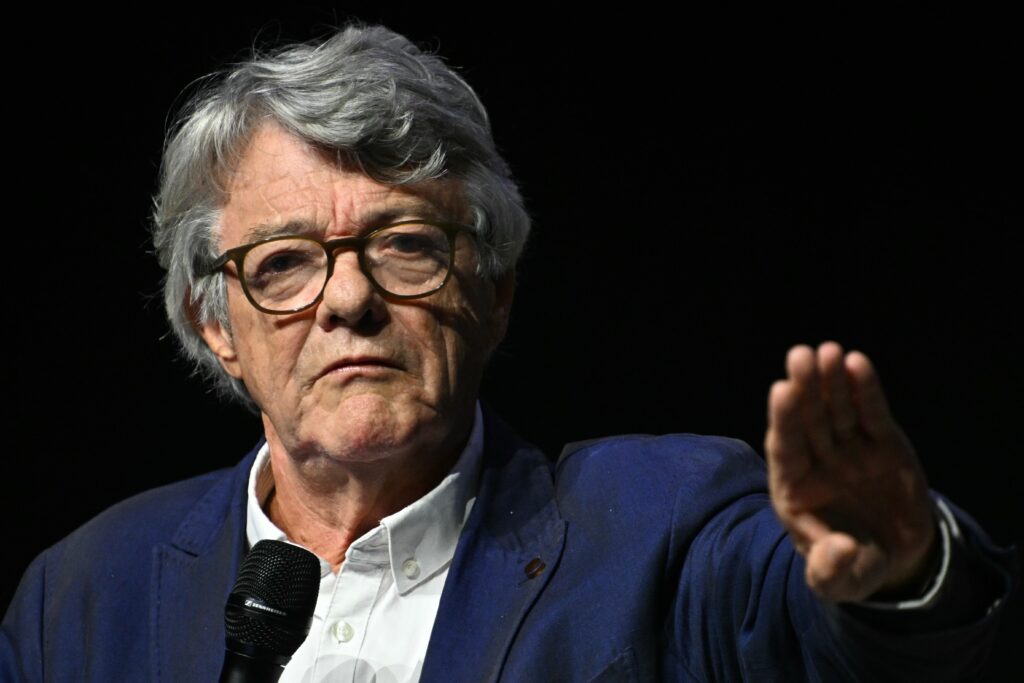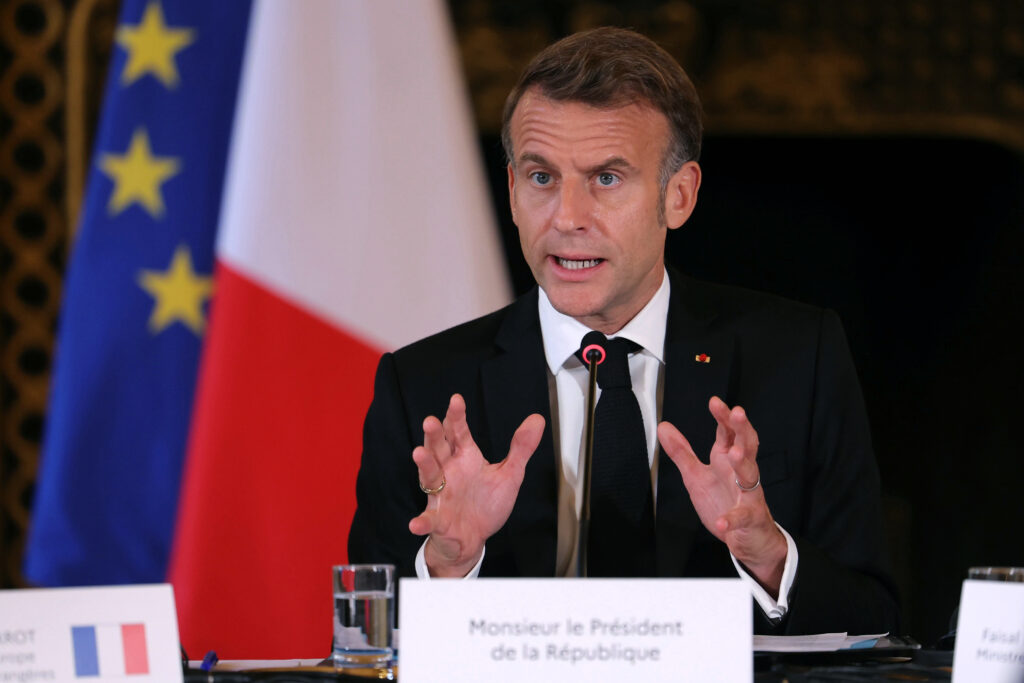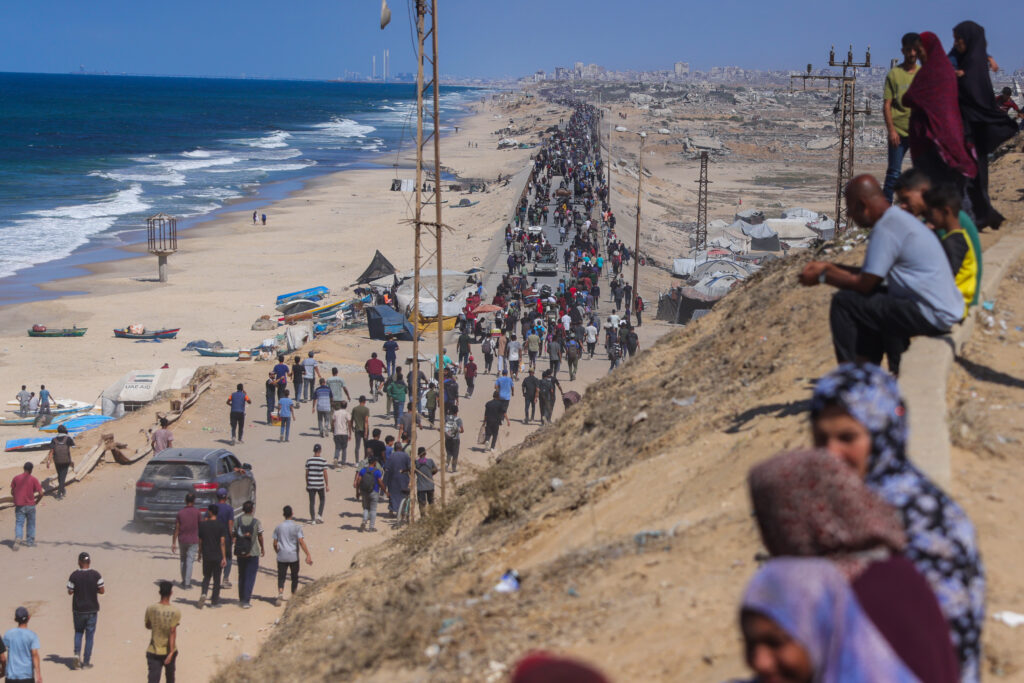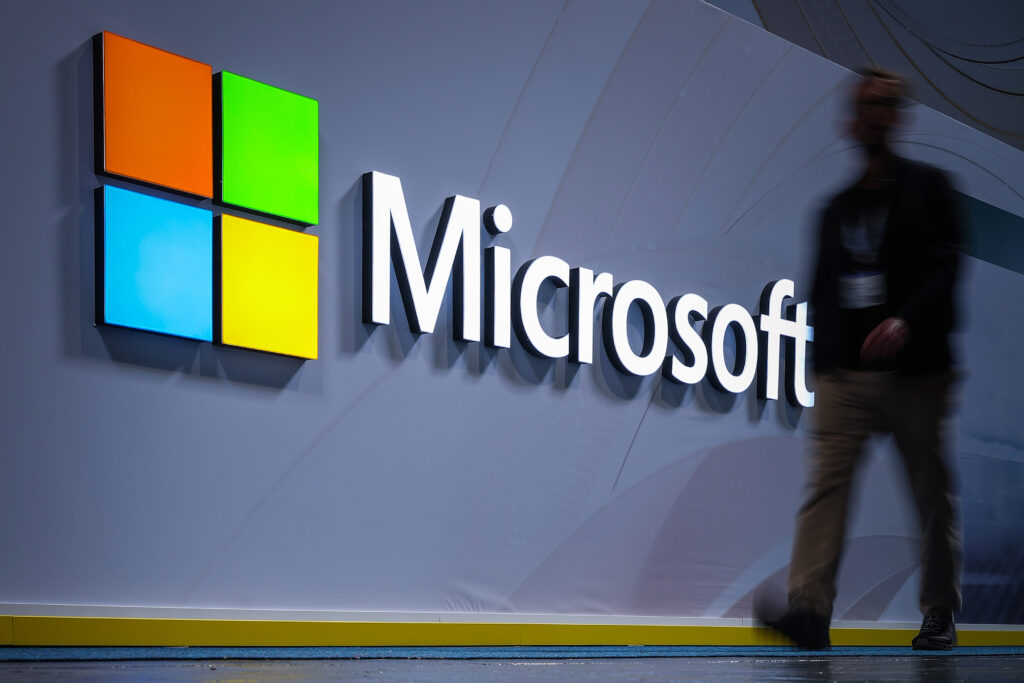Gouvernement: les forces politiques à l’Elysée pour une réunion de crise avec Macron
Emmanuel Macron s’est résolu à descendre dans l’arène. Les chefs des forces politiques sont arrivés vendredi à l’Elysée pour une réunion convoquée en urgence par le président de la République, au pied du mur pour désigner un Premier ministre face aux vetos croisés.Aucun d’entre eux, ni les dirigeants de la droite et du centre arrivés séparément ni ceux de la gauche arrivés groupés dans la cour d’honneur du palais présidentiel, devant les caméras, n’ont fait de déclaration, alors que l’hypothèse d’une reconduction de Sébastien Lecornu quatre jours après sa démission suscite l’irritation jusque dans le camp du chef de l’Etat.Les téléphones ont bipé autour de 02H00 du matin: Emmanuel Macron a invité les chefs de parti et chefs de groupe à l’Assemblée nationale, sauf le Rassemblement national et La France insoumise, à 14H30 à l’Elysée.Cette réunion doit être “un moment de responsabilité collective”, s’est borné à commenter laconiquement la présidence plusieurs heures plus tard, semblant dramatiser ce rendez-vous et faire planer la menace d’une dissolution. Le président n’a pas pris la parole depuis la démission fracassante de Sébastien Lecornu. Une prochaine expression est cependant évoquée par ses proches.Le chef de l’Etat a promis de nommer un Premier ministre d’ici vendredi soir, après deux jours de négociations supplémentaires pour tenter d’arracher, en l’absence de toute majorité à l’Assemblée, un accord de non-censure du futur gouvernement.Le scénario qui revenait le plus en force était la reconduction du Premier ministre démissionnaire, un fidèle macroniste qui a pris la lumière depuis son arrivée à Matignon. “Je ne comprendrais pas qu’il y ait une renomination d’un Premier ministre macroniste”, a toutefois prévenu Agnès Pannier-Runacher, macroniste de la première heure, résumant un état d’esprit répandu dans le camp présidentiel. Le chef du parti présidentiel Renaissance, Gabriel Attal, a lui demandé à nouveau à Emmanuel Macron de “partager le pouvoir”.- “Fable” -Si le nom de Jean-Louis Borloo a beaucoup circulé ces dernières heures, il semble peu probable que ce soit le choix final du président. Au bal des paris, d’autres noms continuaient aussi à être cités, de l’ex-Premier ministre socialiste, Bernard Cazeneuve, au premier président de la Cour des comptes, Pierre Moscovici, lui aussi issu du PS.Avec un double défi pour le chef de l’État: repousser le plus tard possible la menace d’une censure et a fortiori d’une dissolution.En revanche, le scénario d’un Premier ministre de gauche s’éloignait, malgré l’appel à nouveau jeudi soir des chefs de partis socialiste, communiste et écologiste, à “entendre le pays”. “La fable d’un Premier ministre de gauche n’a aucune réalité aujourd’hui”, a moqué vendredi Manuel Bompard (LFI). La gauche hors LFI a prévu de se concerter avant de se rendre à l’Elysée.- Projet de budget prêt -En attendant, l’urgence est de déposer un projet de budget en début de semaine pour que le Parlement dispose bien de 70 jours pour l’examiner, comme le prévoit la Constitution.Mais, a précisé Pierre Moscovici sur RMC-BFMTV, ce projet devra bien être celui qui a été envoyé le 2 octobre au Haut conseil des finances publiques, qui l’a “déjà examiné” et a préparé son avis. Il s’agit donc du texte qui a été le détonateur de la crise actuelle avec le vote de défiance de l’Assemblée nationale qui a provoqué la chute de François Bayrou le 8 septembre.”Qui peut imaginer qu’en 48 heures, on peut tout refaire?”, a interrogé Pierre Moscovici. Ce projet de budget “ne sera pas parfait”, avait reconnu le Premier ministre démissionnaire mercredi à l’issue de ses multiples rencontres avec les partis, et devra être débattu.La France aura-t-elle un gouvernement dès vendredi ou à défaut ce weekend? Les principaux ministres en place seront-ils reconduits? Remplacés par des ministres techniques?Le Premier ministre démissionnaire souhaite que la future équipe gouvernementale soit “complètement déconnectée des ambitions présidentielles pour 2027”, des ambitions qu’il n’a lui-même jamais manifestées.Le président des Républicains, Bruno Retailleau, qui a précipité la chute du gouvernement Lecornu, a indiqué vendredi qu’il ne resterait pas au ministère de l’Intérieur. La veille, il était déjà monté au créneau, refusant la nomination d’un Premier ministre “de gauche” ou “macroniste”. Emmanuel Macron est aussi très attendu sur une éventuelle suspension de la très controversée réforme des retraites de 2023, préalable posé par les socialistes pour un accord de non-censure.
Gouvernement: les forces politiques à l’Elysée pour une réunion de crise avec Macron
Emmanuel Macron s’est résolu à descendre dans l’arène. Les chefs des forces politiques sont arrivés vendredi à l’Elysée pour une réunion convoquée en urgence par le président de la République, au pied du mur pour désigner un Premier ministre face aux vetos croisés.Aucun d’entre eux, ni les dirigeants de la droite et du centre arrivés séparément ni ceux de la gauche arrivés groupés dans la cour d’honneur du palais présidentiel, devant les caméras, n’ont fait de déclaration, alors que l’hypothèse d’une reconduction de Sébastien Lecornu quatre jours après sa démission suscite l’irritation jusque dans le camp du chef de l’Etat.Les téléphones ont bipé autour de 02H00 du matin: Emmanuel Macron a invité les chefs de parti et chefs de groupe à l’Assemblée nationale, sauf le Rassemblement national et La France insoumise, à 14H30 à l’Elysée.Cette réunion doit être “un moment de responsabilité collective”, s’est borné à commenter laconiquement la présidence plusieurs heures plus tard, semblant dramatiser ce rendez-vous et faire planer la menace d’une dissolution. Le président n’a pas pris la parole depuis la démission fracassante de Sébastien Lecornu. Une prochaine expression est cependant évoquée par ses proches.Le chef de l’Etat a promis de nommer un Premier ministre d’ici vendredi soir, après deux jours de négociations supplémentaires pour tenter d’arracher, en l’absence de toute majorité à l’Assemblée, un accord de non-censure du futur gouvernement.Le scénario qui revenait le plus en force était la reconduction du Premier ministre démissionnaire, un fidèle macroniste qui a pris la lumière depuis son arrivée à Matignon. “Je ne comprendrais pas qu’il y ait une renomination d’un Premier ministre macroniste”, a toutefois prévenu Agnès Pannier-Runacher, macroniste de la première heure, résumant un état d’esprit répandu dans le camp présidentiel. Le chef du parti présidentiel Renaissance, Gabriel Attal, a lui demandé à nouveau à Emmanuel Macron de “partager le pouvoir”.- “Fable” -Si le nom de Jean-Louis Borloo a beaucoup circulé ces dernières heures, il semble peu probable que ce soit le choix final du président. Au bal des paris, d’autres noms continuaient aussi à être cités, de l’ex-Premier ministre socialiste, Bernard Cazeneuve, au premier président de la Cour des comptes, Pierre Moscovici, lui aussi issu du PS.Avec un double défi pour le chef de l’État: repousser le plus tard possible la menace d’une censure et a fortiori d’une dissolution.En revanche, le scénario d’un Premier ministre de gauche s’éloignait, malgré l’appel à nouveau jeudi soir des chefs de partis socialiste, communiste et écologiste, à “entendre le pays”. “La fable d’un Premier ministre de gauche n’a aucune réalité aujourd’hui”, a moqué vendredi Manuel Bompard (LFI). La gauche hors LFI a prévu de se concerter avant de se rendre à l’Elysée.- Projet de budget prêt -En attendant, l’urgence est de déposer un projet de budget en début de semaine pour que le Parlement dispose bien de 70 jours pour l’examiner, comme le prévoit la Constitution.Mais, a précisé Pierre Moscovici sur RMC-BFMTV, ce projet devra bien être celui qui a été envoyé le 2 octobre au Haut conseil des finances publiques, qui l’a “déjà examiné” et a préparé son avis. Il s’agit donc du texte qui a été le détonateur de la crise actuelle avec le vote de défiance de l’Assemblée nationale qui a provoqué la chute de François Bayrou le 8 septembre.”Qui peut imaginer qu’en 48 heures, on peut tout refaire?”, a interrogé Pierre Moscovici. Ce projet de budget “ne sera pas parfait”, avait reconnu le Premier ministre démissionnaire mercredi à l’issue de ses multiples rencontres avec les partis, et devra être débattu.La France aura-t-elle un gouvernement dès vendredi ou à défaut ce weekend? Les principaux ministres en place seront-ils reconduits? Remplacés par des ministres techniques?Le Premier ministre démissionnaire souhaite que la future équipe gouvernementale soit “complètement déconnectée des ambitions présidentielles pour 2027”, des ambitions qu’il n’a lui-même jamais manifestées.Le président des Républicains, Bruno Retailleau, qui a précipité la chute du gouvernement Lecornu, a indiqué vendredi qu’il ne resterait pas au ministère de l’Intérieur. La veille, il était déjà monté au créneau, refusant la nomination d’un Premier ministre “de gauche” ou “macroniste”. Emmanuel Macron est aussi très attendu sur une éventuelle suspension de la très controversée réforme des retraites de 2023, préalable posé par les socialistes pour un accord de non-censure.
Cessez-le-feu à Gaza, des milliers de déplacés sur le chemin du retour
Un accord de cessez-le-feu entre Israël et le Hamas est entré en vigueur vendredi dans la bande de Gaza, précipitant des milliers de déplacés sur le chemin du retour à travers le territoire palestinien dévasté par deux ans de guerre.Le Premier ministre israélien Benjamin Netanyahu a dit espérer que son pays pourrait célébrer “un jour de joie nationale” dès lundi soir avec “le retour de tous les otages” retenus à Gaza.Après l’annonce par l’armée israélienne de l’entrée en vigueur du cessez-le-feu à 09H00 GMT, des milliers de déplacés ont pris la route vers le nord du territoire alors que d’autres sont retournés dans les ruines de leurs maisons à Khan Younès, dans le sud, selon des images de l’AFP.Une file de piétons s’étirait le long de la route al-Rachid près de Nousseirat, dans le centre de la bande de Gaza, en direction de Gaza-ville.”Lorsque j’ai appris la nouvelle du retrait israélien et que la route serait ouverte, on s’est dirigé immédiatement avec ma famille vers la route al-Rachid pour retourner chez nous”, a déclaré Ahmad Azzam, un déplacé âgé de 35 ans, originaire de Gaza-ville.”Nous rentrons chez nous malgré les destructions, le siège et la douleur. Nous sommes heureux même si nous retournons dans des ruines. Au moins c’est notre terre”, a dit Amir Abou Iyadeh, 32 ans, à Khan Younès.L’armée israélienne a annoncé un repositionnement de ses troupes dans des secteurs de la bande de Gaza assiégée et ravagée par la guerre, déclenchée par une attaque sans précédent du mouvement islamiste palestinien Hamas le 7 octobre 2023 contre Israël.Mais elle a averti que plusieurs zones restaient “extrêmement dangereuses” pour la population civile.Le cessez-le-feu et la libération des otages sont prévus dans le cadre d’un accord conclu jeudi après quatre jours de négociations indirectes en Egypte entre le Hamas et Israël via des médiateurs internationaux dont les Etats-Unis.L’accord, approuvé par le gouvernement israélien, est basé sur un plan annoncé fin septembre par le président américain Donald Trump pour mettre fin à la guerre.- 20 otages vivants -Selon la Défense civile palestinienne, les forces israéliennes se sont retirées de plusieurs zones de Gaza-ville et de parties de Khan Younès.Au cours de cette première étape du retrait, l’armée continuera de contrôler environ 53% de la bande de Gaza, selon le gouvernement israélien.L’armée américaine “a confirmé que les forces israéliennes avaient achevé leur retrait sur la +ligne jaune+” prévue par le plan Trump et “la période de 72 heures pour la libération des otages a commencé”, selon l’émissaire américain Steve Witkoff.Jeudi, M. Trump a affirmé qu’il prévoyait de se rendre dimanche au Moyen-Orient. “Les otages rentreront lundi ou mardi. Je serai probablement là. Nous prévoyons de partir dimanche.”Sur les 48 otages -47 enlevés durant l’attaque du 7 octobre et un soldat tué en 2014 dont le Hamas détient la dépouille- 20 sont vivants et 28 décédés, a déclaré M. Netanyahu.En échange des otages, Israël doit libérer 250 détenus pour raisons de sécurité, dont de nombreux condamnés, ainsi que 1.700 Palestiniens de Gaza arrêtés depuis octobre 2023. Vendredi, il a publié la liste des 250 prisonniers en question, qui ne comprend aucun des principaux détenus dont le Hamas réclamait la libération, comme Marwan Barghouthi.Au total 251 personnes avaient été enlevées durant l’attaque du 7 octobre et emmenées à Gaza. Des libérations de captifs en échange de prisonniers palestiniens avaient eu lieu lors de précédentes trêves fin 2023 et début 2025.- Divergences -L’accord conclu en Egypte s’intègre dans le plan en 20 points de M. Trump qui prévoit un cessez-le-feu, une libération des otages, un retrait par étapes israélien de Gaza, un désarmement du Hamas et la mise en place d’une autorité de transition formée de technocrates chapeautée par un comité dirigé par Donald Trump.Il a porté sur la première phase du plan Trump. La deuxième concerne un désarmement du Hamas et l’exil de ses combattants, la poursuite du retrait par étapes d’Israël de Gaza, des points de divergence entre les belligérants.Le Hamas n’a pas réagi à l’appel à son désarmement et réclame le retrait total israélien de Gaza.Un responsable du Hamas, Oussama Hamdane, a rejeté la création du comité présidé par M. Trump.M. Netanyahu exige le désarmement du mouvement islamiste et a affirmé vouloir maintenir l’armée dans la majorité du territoire palestinien. Du côté israélien, l’attaque du 7 octobre a entraîné la mort de 1.219 personnes, en majorité des civils, selon un bilan établi par l’AFP à partir de données officielles.En riposte, Israël a lancé une campagne militaire à Gaza qui a fait, selon le ministère de la Santé du Hamas, plus de 67.194 morts, en majorité des civils, et provoqué un désastre humanitaire.
Après deux ans de guerre, les Gazaouis sur les routes pour retrouver leurs maisons
Meurtris par deux ans de guerre, mais poussés par l’espoir, des Palestiniens ont pris la route par milliers vendredi après l’annonce du cessez-le-feu dans la bande de Gaza, impatients de retrouver leurs maisons même parmi les ruines.En direction du nord, le mouvement a d’abord été timide, avant de grossir le long de la route al-Rachid. A la mi-journée une file de piétons s’étirait, souvent sans effets personnels, si ce n’est des sacs à dos. Quelques véhicules avançaient lentement dans le même sens au milieu de la foule, comme le montrent des images filmées par l’AFP à Nousseirat, dans le centre de la bande de Gaza.Certains dans le cortège scandent “Dieu est grand”, applaudissent, sifflent en signe de joie. Dans la foule, Ibrahim al-Helou, originaire de la ville de Gaza et qui était déplacé dans le camp de réfugiés d’al-Maghazi au centre du territoire, oscille entre enthousiasme et prudence.Quand il a commencé à rentrer chez lui, “la situation était dangereuse, avec des coups de feu”, raconte le quadragénaire. Il dit avoir alors attendu un moment avant de reprendre la route vers Gaza pour vérifier l’état des maisons là bas et “évaluer la situation”.- Situation dangereuse -Vendredi, tôt, le gouvernement israélien a indiqué avoir approuvé la première phase de l’accord de cessez-le-feu à Gaza et de libération dans les 72 heures des otages, un accord conclu avec le Hamas dans la nuit de mardi à mercredi en Egypte. Cet accord vise à mettre fin à la guerre de deux ans déclenchée par l’attaque sans précédent du mouvement islamiste palestinien Hamas en Israël le 7 octobre 2023. Ahmad Azzam, autre déplacé de la ville de Gaza, 35 ans, raconte avoir avoir déménagé dès qu’il a appris le retrait des troupes. “Lorsque j’ai appris la nouvelle du retrait israélien et que la route serait ouverte dans les heures à venir, ma famille et moi nous sommes immédiatement rendus à al-Rachid Street pour retourner à Gaza”, explique-t-il à l’AFP.Trouvant la situation dangereuse, il a préféré attendre sur une colline surplombant la route côtière. “Seules quelques personnes prennent le risque d’avancer”, a-t-il déclaré à midi, heure à laquelle le retrait des troupes a officiellement commencé.L’armée israélienne a averti vendredi la population de la bande de Gaza que plusieurs zones du territoire restaient “extrêmement dangereuses.”- “La joie” de rentrer chez soi – Plus au sud, dans la grande ville de la partie méridionale du territoire Khan Younès, des centaines de déplacés retournaient eux-aussi vers les ruines de leurs maisons, à la faveur du retrait de l’armée israélienne de plusieurs zones du territoire palestinien.Bidons et bouteilles d’eau vides à la main, à pied pour la plupart ou pour certains, rares, en vélo, ils avançaient entre les décombres de bâtiments détruits sur des chemins poussiéreux, selon des images de l’AFPTV.Au milieu d’un monticule de gravas, un homme jette des bouts de bois, semblant faire le tri de ce qui peut être récupérer.”Cela fait deux ans que nous sommes déplacés, vivant sur les trottoirs, sans abri ni endroit où loger. Dieu merci, la trêve est proche”, commentait dans la matinée Arij Abou Saadaeh, une Gazaouie déplacée en route vers chez elle à Bani Suheila, pleine d’espoir que “la trêve durera”. Elle dit “pleurer profondément” un fils et une fille morts pendant la guerre, mais se “réjouit” malgré tout “de la trêve et de la paix”, car la trêve veut-elle croire “apporte aussi de la joie: le retour chez nous”. Amir Abou Iyadeh, autre Gazaoui déplacé, âgé de 32 ans, raconte être déjà retourné la veille chez lui. “Nous retournons chez nous pour nettoyer, malgré les destructions, le siège et la douleur”, dit-il, sac à dos rose sur le torse, tenant par une main sa fille, de l’autre main un bidon vide. “Nous retournons chez nous, chargés de blessures et de chagrin”, mais “nous sommes heureux – même si nous retournons dans des ruines sans vie, au moins c’est notre terre. Espérons que le calme reviendra et que la guerre prendra fin.”
Autriche: Microsoft sommé à la transparence sur les données
L’autorité autrichienne de protection des données a ordonné à Microsoft d’accorder aux utilisateurs de son logiciel éducatif l’accès à leurs données, estimant que le géant américain avait violé le droit européen.”La décision met en lumière le manque de transparence de Microsoft 365 Education”, a déclaré vendredi Felix Mikolasch, avocat spécialisé en protection des données de Noyb, une ONG de protection des utilisateurs. “Il est presque impossible pour les écoles d’informer les élèves, les parents et les enseignants de ce qui se passe avec leurs données”, a-t-il ajouté dans le communiqué.L’autorité autrichienne de protection des données a confirmé avoir rendu sa décision mercredi, mais n’a pas donné plus de détails.None of Your Business (Noyb) représentait une mineure et son père, qui avaient déposé en 2024 une plainte contre l’entreprise, accusant son logiciel éducatif Microsoft 365 de tracer illégalement les élèves et d’utiliser leurs données à des fins propres.Ils soupçonnaient Microsoft d’installer des cookies qui collectent des données de navigation et sont utilisés à des fins publicitaires, une pratique qui affecterait probablement des millions d’élèves et d’enseignants à travers l’Europe.Alors que Microsoft ne répondait pas aux demandes d’accès aux données liées à son logiciel éducatif, l’entreprise “a tenté de transférer toute la responsabilité aux écoles locales” ou à d’autres institutions nationales, a déclaré Noyb.Microsoft a répondu dans un communiqué envoyé à l’AFP que l’entreprise examinerait la décision et déciderait “des prochaines étapes en temps voulu”.”Microsoft 365 respecte toutes les normes et les établissements peuvent continuer à l’utiliser en conformité avec le RGPD”, le Règlement général sur la protection des données de l’UE, a-t-il assuré.Noyb a lancé plusieurs actions en justice contre des géants de la technologie, incitant souvent les autorités de régulation à agir contre des violations du RGPD.Il a déposé plus de 800 plaintes dans diverses juridictions au nom des utilisateurs d’Internet.





